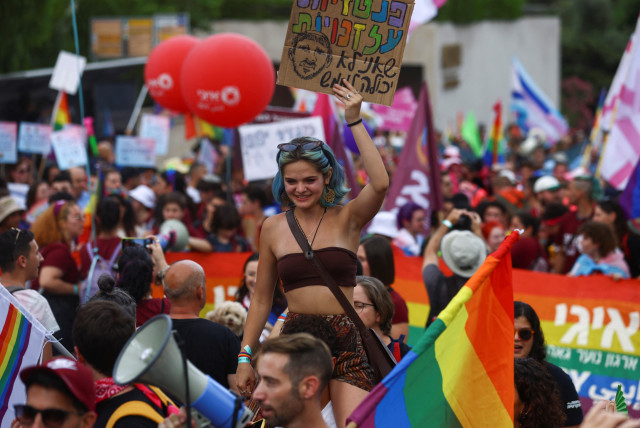Pride is needed and should not be cancelled - comment

The Broad Perspective: Hosting a Pride Parade, now more than ever, can draw international attention to the struggles faced by this Israeli minority and garner support from allies.
A video that went viral on Instagram and TikTok approximately a year ago asked people on the streets of Los Angeles where the best Pride Parade was.
A majority said “Tel Aviv!”
Unfortunately, little in Israel brings about empathy among more liberal and progressive communities abroad, but the Tel Aviv Pride Parade is one exception.
It is lively, boisterous, and, above all, joy incarnate. It is the true celebration of loving who you love in a country where LGBTQ+ couples do not have the same rights as straight couples.
So, it is no surprise that the cancellation of the Pride Parade, announced Wednesday by Tel Aviv Mayor Ron Huldai, was exceptionally upsetting and caused quite a ruckus in the LGBTQ+ community.
“This is not the time for celebrations,” Huldai said. “132 of our sons and daughters are still kidnapped in Gaza, the circle of bereavement is expanding every day, and we are in one of the most difficult periods of the State of Israel… See you at the Pride Parade in June 2025.”
He said that the municipality decided to opt instead for smaller-scale “activities” and a rally.
Small-scale activities are always available, though, and a rally, no matter what, cannot reach the same scale of prominence as a parade – a prominence vital for Israel and its queer community.
That would have been different if he had made an argument for safety. It was still a weak argument, but at least it would have made more sense.
But here, the central difference between a parade and a rally is the conversion from a celebration to a demonstration.
Pride Parade worldwide is not always necessarily a party; Tel Aviv Pride Parade, however, is. That is not an easy pill to swallow while Israelis are being held hostage, but it is one we need.
Hamas’s goal on October 7 was to tear us down.
Holding Israelis hostage, alongside the anti-Israel campaign worldwide, were both designed to weaken us.
Holding a Pride parade now can serve as a powerful symbol of resilience and defiance against this. It sends a message: despite our uphill battle, we are still one people and refuse to be silenced or marginalized.
Just as the LGBTQ+ community fights to be heard and seen daily, so, too, will we. Just as the queer community is constantly silenced and refuses to back down, so, too, will we.
STUDIES HAVE shown that LGBTQ+ people and groups feel more isolated than all others in conflict zones.
A sense of community – of support – is vital. We must show this beautiful rainbow of a community that they are loved and their challenges have not been forgotten, even among all the chaos we face today. We can give them strength, just as we send strength into Gaza to our hostages.
As mentioned, the world does not see Israel as an exceptionally liberal country today. Despite having such a strong religious choke hold politically, one of our primary strengths in showing that the country is forward-thinking is through the exceptional stance of the Tel Aviv Pride Parade – and the Jerusalem one, too.
Hosting a Pride Parade, now more than ever, can draw international attention to the struggles faced by this Israeli minority and garner support from allies who have remained, until now, silent.
Israel’s treatment of the LGBTQ+ community, while very much far from the ideal, is world’s away from the treatment of the queer community in the Gaza Strip, for example.
Pride promotes tolerance. It celebrates “different” being okay and mutual understanding. This is the very message we need to project outward; we encourage empathy and mutual respect, not murder, not anything like what was done to us by Hamas terrorists on October 7.
Massive waves of anti-Israel protests, hidden behind masks and keffiyehs, have cropped up across the US and the entire world, and they originate in this shaky premise that Israel is inhumane and is committing genocide.
By showing our human side and fighting for the humanitarian rights of our people, we humanize ourselves within this conflict.
Of course, such large gatherings may be considered insulting to the hostages.
However, I – and I am sure I am not alone in this thinking – believe that now is the time to show that we have not caved in on ourselves.
We are still a land of love, flowing with milk and honey for all our communities – and we will dance again.
The writer is deputy editor-in-chief of The Jerusalem Post.
Jerusalem Post Store
`; document.getElementById("linkPremium").innerHTML = cont; var divWithLink = document.getElementById("premium-link"); if (divWithLink !== null && divWithLink !== 'undefined') { divWithLink.style.border = "solid 1px #cb0f3e"; divWithLink.style.textAlign = "center"; divWithLink.style.marginBottom = "15px"; divWithLink.style.marginTop = "15px"; divWithLink.style.width = "100%"; divWithLink.style.backgroundColor = "#122952"; divWithLink.style.color = "#ffffff"; divWithLink.style.lineHeight = "1.5"; } } (function (v, i) { });

